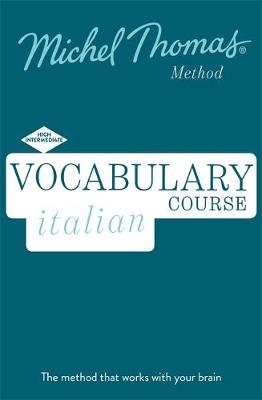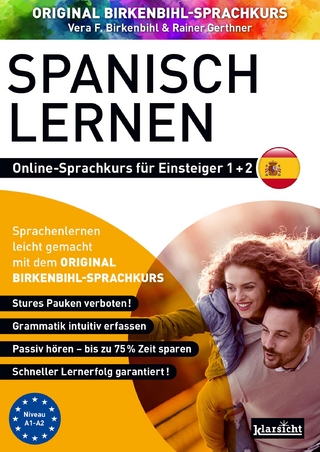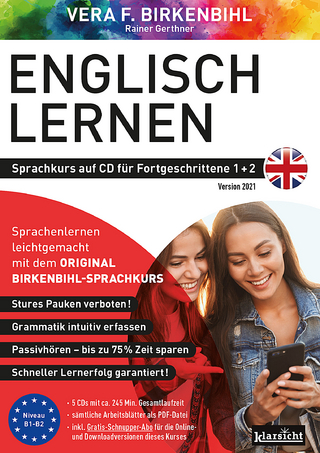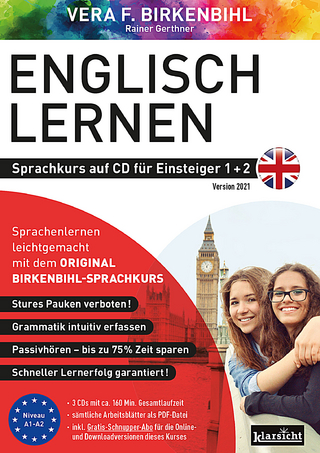
Italian Vocabulary Course (Learn Italian with the Michel Thomas Method)
Michel Thomas Method (Verlag)
978-1-4736-9285-5 (ISBN)
- Titel ist leider vergriffen;
keine Neuauflage - Artikel merken
'I will build the foundation of the house, but it's up to you to decorate it.' Michel Thomas
Experience significant results in a remarkably short period of time thanks to the unique Michel Thomas Method, perfected over 50 years by celebrated psycholinguist Michel Thomas. The method works in tune with how the brain prefers to receive, store and then retrieve information. You'll stick with it, because you'll love it.
* Improve your Italian naturally and unforgettably, without strain
* Learn from listening and speaking, without the pressure of writing or memorizing
* Build up your Italian in manageable steps by thinking out answers for yourself
How does it work?
Learning vocabulary is notoriously difficult if attempted in the traditional way - with long lists and hours of memorization. With the Michel Thomas Method, new words and phrases are presented in such a way that they cannot be forgotten. In this five-hour phase-two course, Michel Thomas Method teacher Paola Tite introduces over 1,000 carefully chosen 'power words,' including verbs and everyday phrases. Learning alongside two genuine students, you will exponentially build up your vocabulary by unlocking what you already know.
What's new?
This new edition includes remastered audio and comes in new, eco-friendly recyclable packaging.
Why is it so successful?
'What you understand, you know; and what you know, you don't forget.' - Michel Thomas
Michel Thomas believed that the greatest barrier to any form of learning was stress: stress from worrying about remembering what you are being taught, stress from being afraid to make a mistake, stress from failing.
With the Michel Thomas Method, all the attention is focused on removing stress and tension from the learning environment. The teacher takes on full responsibility for your understanding, and therefore your remembering, of what is being taught. In fact, the Michel Thomas Method forbids you from trying to memorize. There's no writing, no books, no homework.
The Michel Thomas Method works by stripping away all inessential language and breaking down the most important language into its component parts. Crystal-clear building blocks are then presented, and only when they are absorbed and understood is the next piece of the puzzle introduced, enabling you to reconstruct the language for yourself - to form your own sentences, to say what you want, when you want.
What's in the Course?*
Italian Vocabulary Course comprises 5 course CDs. The booklet is available to download from www.michelthomas.com.
*Note that the course content is the same as the previously entitled Italian Vocabulary Builder+ course, but does not include a CD-ROM.
Learn anywhere
Michel Thomas Method audio courses let you learn whenever you want: at home, in your car, or on the move. The audio CDs are MP3-compatible.
What learners are saying
I experienced the same sort of pleasure that you got from suddenly getting a crossword clue right or cracking a code...the finger-snapping moment of, Oh My God! I've just understood what you've said to me in Spanish or you've just understood me! -Peter LØVSTRØM , Actor, 2017
I've used Michel Thomas to get off the starting block for French, Italian and Spanish and I'm always surprised by how much I can say after only a few hours of listening. The Michel Thomas Italian course organises verbs into logical groups which helps you pick them up fast. And perhaps more importantly, it shows you how to use this grammar to build useful sentences. -Katie from Joyoflanguages.com
Michel Thomas (1914-2005) had an amazing life. Born in Poland, he spent his early years in Germany and then in France, where he studied psychology at the Sorbonne in Paris. When war broke out, he fought with the Resistance and suffered imprisonment in labour camps. At the end of the war he joined the US liberation army and later settled in the US where he established his world-famous language school. Languages, being his strength and passion became the focus of the next 50 years of his life that he spent developing a method that he hoped would change the way we teach and learn - so that everyone could succeed. He developed this method 'that works with the brain'. After creating several courses of his own, he passed on his method so that other teachers might use it too. Paola Tite is a teacher of Italian, author of Italian language books and an editorial consultant. As a native speaker of Italian, Paola attended Michel Thomas's Italian workshops and recording sessions at Hodder & Stoughton, and became an enthusiastic follower of his approach not only to language learning but to teaching in general. Paola Tite is a teacher of Italian, author of Italian language books and an editorial consultant. As a native speaker of Italian, Paola attended Michel Thomas's Italian workshops and recording sessions at Hodder & Stoughton, and became an enthusiastic follower of his approach not only to language learning but to teaching in general.
: Introduction: How this course came about, what it does and does not include, how it works, and how it is both faithful to and expands upon the Michel Thomas Language Courses.
: Course segment 1: Cognates
: Introduction
: -ible to -ibile: possible to possibile (an extra 'i'); horrible to orribile (no h); etc.
: -able to abile: probable to probable; acceptable to accettabile (double cc, double tt); etc.
: -al to -ale: canal to canale; cathedral to cattedrale; general to generale; etc.
: -ARE verbs to -abile: desiderare (to wish) to desiderabile (desirable); sopportare (to bear) to sopportabile (bearable); riciclare (to recycle) to riciclabile; etc.
: Add in to make a negative word: evitabile (avoidable) to inevitabile (inevitable; unavoidable); soppportabile to insopportabile; etc.
: Diminutive -ino, -etta: motore (engine) to motorino (moped); fratello (brother) to fratellino (affectionate, little brother); casa (house) to casetta (nice little house); Giovanni to Giovannino (nickname). Giulia to Giulietta (nickname)
: -ERE verbs to -ibile: credere (to believe) to credibile (believable); vendere (to sell) to vendibile (saleable); etc.
: -IRE verbs to -ibile: punire(to punish) to punibile (punishable); definire (to define) to definibile (definable);
: more -ible to -ibile: flexible to flessibile (no x in Italian); compatible to compatibile and incompatibile; etc.
: -ant to -ante: important to importante; restaurant to ristorante; etc.
: ARE verbs to -ante: allarmare (to alarm) to allarmante (alarming); affascinare (to fascinate) to affascinante (fascinating); etc.
: -ent to -ente: different to differente; evident to evidente; incompetent to incompetente; etc.
: -tion to -zione: condition to condizione; attention to attenzione; formation to formazione; etc.
: -sion to -sione: impression to impressione; decision to decisione; mission to missione; etc.
: -ence to -enza: influence to influenza; difference to differenza; preference to preferenza; etc.
: Words that look feminine but are masculine: the problem to il problema; the climate to il clima; a poet to un poeta; etc.
: -ance to -anza: importance to importanza; elegance to eleganza; distance to distanza; etc.
: -ly to -mente: personally to personalmente; probably to probabilmente; etc.
: Use 'realmente' for actually and 'attualmente' for nowadays.
: -ary to -ario: necessary to necessario; contrary to contrario; etc.
: No need for 'a' when talking about professions: Lavorava come missionario (as a missionary)
: -ive to -ivo: exclusive to esclusivo (no x in Italian); positive to positivo; constructive to costruttivo (change ct to double tt); etc.
: -ute to -uto: absolute to assoluto; institute to istituto; attribute to attributo; etc.
: -ical and -ic to -ico: practical to pratico; magic to magico; economic to economico; etc.
: -ure to -ura: temperature to temperatura; culture to cultura; etc.
: -ity to -ità: possibility to possibilità; humanity to umanità; liberty to libertà; etc. Require an accent over the stressed final a.
: -ist to -ista: artist to artista; dentist to dentista; optimist to ottimista; etc.
: -y to ia: irony to ironia; astronomy to astronomia; philosophy to filosofia; etc.
: -in or -ine to -ina: vitamin to vitamina; discipline to disciplina; medicine to medicina; etc.
: -id to -ido: solid to solido; valid to valido; timid to timido; etc.
: -ism to -ismo: organism to organismo; capitalism to capitalismo; heroism to eroismo; etc.
: Course segment 2: Verbs
: -ARE verbs: the 'good guys': evitare (to avoid); mangiare (to eat); usare (to use); inventare (to invent); parlare (to speak); raccomandare (to recommend); comprare (to buy)
: Using quel, quei, quegli - that, those
: Using qualcosa di (speciale) - something (special)
: Using Mi piace - It is pleasing / It pleases me
: Mi piacciono - They are pleasing / They please me; Gli piace - It pleases him; Ci piace - It pleases us; Non ci piace - It doesn't please us
: More -ARE verbs: gridare (to shout); guadagnare (to earn)
: Wing tense endings: -ARE Track and the Other Track (-ERE, -IRE verbs): are - avo (guadagnavo); ere - evo (vivevo); ire - ivo (capivo)
: Inventing -ARE verbs using -tion words in English. Remove the 'tion' and add -re: invitation to invitare (to invite); confirmation to confermare (to confirm); etc.
: More -ARE verbs: dimenticarsi (to forget); cenare (to dine); giustificare (to justify); immaginare (to imagine); installare (to install); adorare (to adore); considerare (to consider); ispirare (to inspire); studiare (to study); consolare (to console); or
: -ARE verbs (various tenses): comprare (to buy)
: Using 'se fossi' for 'If I were...' plus the conditional tense (-rei): Se fossi ricco, comprerei un appartamento a Portofino. (If I were richer, I would buy an apartment in Portofino.)
: When 'would' refers to the past: Quando ero ricco, compravo una macchina nuova tutti gli anni. (When I was a rich man, I would buy / I used to buy / I bought a new car every year.)
: More -ARE verbs (various tenses): lavare (to wash); chiamare (to phone; to call); guardare (to look at); prestare (to lend); lasciare (to leave); baciare (to kiss); scusare (to excuse)
: 'was in the process of' plus the dot past: Stavo lavando i piatti quando mi ha chiamato. (I was washing the dishes when you called me.)
: 'is in the process of': Mi sta guardando adesso. (She's looking at me now.)
: Using -i ending for formal commands: Non mi tocchi! (Don't touch me!); Mi lasci stare. (Leave me alone.); Mi scusi. (Excuse me.)
: Using -a ending and hooking pronouns to the verb for familiar commands: Baciami (Kiss me); Scusami (Excuse me)
: The Other Track: -ERE and -IRE verbs: bere (to drink); leggere (to read); capire (to understand); rispondere (to respond; to answer); scrivere (to write); ridere (to laugh); piangere (to cry)
: Reflexive verbs - When the Subject and Object are the same: think '...self': nascondersi (to hide oneself); svegliarsi (to wake up; to wake oneself up); sedersi (to sit down; to sit oneself down); alzarsi (to get up or stand up; to get oneself up); lava
: With added 'ne': andarsene (to go away from here); dimenticarsene (to forget abut it)
: The impersonal 'one': Si mangia bene qui. (One eats well here.); Si parla italiano qui. (Italian is spoken here.); Come si dice questo in italiano? (How do you say this in Italian?)
: More practice with -ERE verbs and reflexives: promettere (to promise); permetter (to permit); proteggersi (to protect oneself); difendersi (to defend oneself)
: More -ERE and -IRE verbs; future tense: bere (to drink); pulire (to clean); vendere (to sell); perdere (to lose)
: The future endings on all tracks: rò, rai, rà, remo, rete, ranno: Praticherò sempre il mio italiano. (I will always practise my Italian.)
: The -go -gono verbs: valere (to be worth); valere la pena (to be worth it); valgo to valga in command tense
: La, l' (it) and li (them): La chiave, l'ho perduta. (The key, I've lost it). I biglietti, non li ho perduti (he tickets, I haven't lost them.)
: More -ERE and -IRE verbs: diving into the past, the command tense: temere (to fear); tossire to cough); credere (to believe); crescere (to grow); riconoscere (to recognize); mettere (to place or put)
: Using -a ending for formal commands: Lo metta nella mia macchina.
: Using -i ending and hooking pronouns to the verb for familiar commands: Mettilo nella mia macchina.
: More -ERE and -IRE verbs; some special verbs: ammettere (to admit); insistere a (insist on); omettere (to omit); decidere (to decide); ricevere (to receive); descrivere (to describe); assistere a (to attend); dire (to say or tell)
: More -go -gono verbs: venire (to come), vengo, vengono; tenere (to keep, to hold), tengo, tengono
: Non credo che tengano animali nell'appartamento. (I don't believe they keep pets in the flat.)
: Two -IRE verbs that go from -u to -e: uscire (to go out; to leave): Esco tutte le sere. (I go out every evening); riuscire a (to manage to): Non riesco mai a vederli. (I never manage to see them.)
: Some more -IRE verbs: without -isc, with -isc: without isc: soffrire (to suffer); scoprire (to discover); aprire (to open); dormire (to sleep); with -isc: proibire (to prohibit); pulire (to clean), pulisco (I clean); contribuire (to contribute), contr
: -URRE, -ORRE, -ARRE verbs: tradurre (to translate), I translate = traduco; command tense = traduca; past tense dives into 'tradotto'; produrre (to produce), I produce = produco; past tense dives into 'prodotto'; comporre (to compose), I compose = compongo
: Verbs that go from -e to -ie : venire (to come), vieni, viene; tenere (to keep, to hold), tieni, tiene; contenere (to contain), contiene
: Verbs that go from -o to -uo; rebel -ARE verbs: volere (to want), vuoi, vuole; potere (to be able), puoi, può; andare (to go), vado, vai, va; fare (to make, to do), faccio, fai, fa; dare (to give), do, dai, dà
: Future endings: -rò, rai, rà, remo, rete, ranno (hit the r)
: On the -ARE Track change -are to -ere: parlare - parlerò, invitare - inviteremo
: Rebel verbs: andare - andrò; venire - verrò
: Conditional
: Conditional endings: -rei, resti, rebbe, remmo, reste, rebbero (hit the r)
: volere - vorrei; venire - verrei; vedere - vedrei; mi piace - mi piacerebbe; preferire - preferirei
: Revising commands: Formal you: non li metta qui (don't put them here), me lo dica (tell me it), mi dia (give me); Familiar you: mettili qui (put them here), dimmi (tell me), dammi (give me); Let's...: parliamo, cantiamo, mangiamo; cambiamolo, andiamoc
: Expressions that trigger the formal command tense
: Whenever you want someone else to do something: volere che (to want that); preferire che (to prefer that); proporre che (to propose that)
: Expressing permission or prohibition: permettere / non permettere che (to permit / not to permit that)
: Expressing emotion, doubt, impersonal è: temere che (to fear that); essere contento che (to be glad that); dubitare che (to doubt that); essere ridicolo che (to be ridiculous that); mi dispiace che (I'm sorry that); è un peccato che (it's a sh
: The formal command tense in the past:
: -ARE Track: parl-assi, parl-assi, parl-asse, parl-assimo, parl-aste, parl-assero
: -ERE Track: pot-essi, pot-essi, pot-esse, pot-essimo, pot-este, pot-essero
: -IRE Track: fin-issi, fin-issi, fin-isse, fin-issimo, fin-iste, fin-issero
: Era impossibile che venisse. (It was impossible that he might come.)
: More about the formal command tense in the past:
: Dubito che Paolo abbia mangiato. (I doubt that Paolo has eaten.)
: Dubitavo che venisse. (I doubted that you would come.)
: Course segment 3: Everyday expressions
: Verb expressions with 'stare': stare + -ando (ARE Track), -endo (Other Track)
: stiamo mangiando (we are eating), stavamo mangiando (we were eating); stare per + the 'to' form of the verb (-are, -ere, -ire)
: stiamo per cominciare a mangiare (we are about to start eating); stavo per lavare la mia macchina (I was about to wash my car)
: Verb-plus expressions: cominciare a (to start to); smettere di (to stop doing something), tornare a (to return to doing something), finire di (to finish doing something)
: These verb-plus expressions are followed by the 'to' form of the verb in examples such as these: Abbiamo smesso di mangiare. (We stopped eating.); Avevamo finito di lavorare presto. (We had finished working early.); approfittare di qualcosa / qualcuno (
: More verb-plus expressions: dimenticarsi di (to forget to); contare su qualcosa / qualcuno(to count on something / somebody); rendersi conto di qualcosa (to realize, to notice something); essere / non essere d'accordo con qualcuno (to agree / disa
: Verb- plus combo: vuol dire (it means), vuol dire che (it means that); vale la pena + 'to' form of the verb (it is worth to), valeva la pena (it was worth to)
: Time expressions with 'da': Aspettiamo da un'ora. OR È un'ora che aspettiamo. (We've been waiting for an hour.); Maria viveva a Roma da due anni. OR Erano due anni che Maria viveva a Roma. (Maria had been living in Rome for two years.); Da quan
: Weather expressions with 'fare': Fa caldo. (It's hot); Fa freddo. (It's cold.); Che tempo fa? (What's the weather like?'; Fa bel tempo. (The weather is good.); Faceva brutto tempo ieri. (The weather was bad yesterday.); C'è il sole. (It's sunny
: Some other uses of 'fare': fare una domanda (to ask a question); fare un viaggio (to take a trip)
: fare attenzione (to be careful); farsi male (to hurt oneself)
: Expressions using 'avere': avere freddo (to be cold); avere caldo (to be warm); avere sete (to be thirsty); avere fame (to be hungry); avere paura (to be afraid) ; avere sonno (to be sleepy); avere fretta (to be in a hurry); avere ragione (to be right); a
: More expressions using 'avere': avere X anni (to be X years old); aver luogo (to take place) ; avere pazienza (to be patient); avere senso (to make sense)
: Uses of 'per': non è possibile per me, il pacco è per me, per poter parlare, per quando, per la settimana prossima
: Words used to ask questions: why - perché; how much - quanto and quanta; how many - quanti and quante; how - come; where - dove; who - chi; which or which one - quale
: Days of the week
: Time expressions: prima di (before); dopo (after)
: More days of the week
: Seasons of the year
: Months of the year
: Double pronouns hooked on to the verb: Può prepararmelo prima dell'autunno? Può mandarglielo oggi?
: Telling the time: È l'una. (It's one o'clock.); Sono le due. (It's two o'clock.); Per le sei e mezza. (By six thirty.) ; Erano le sei e un quarto. (It was quarter past six.); È mezzogiorno. (It's midday.); È mezzanotte. (It's midnight.); &
: Time of day
: Numbers
: More uses of 'da': for and since: Studiamo italiano da tre mesi / da giugno.; from: Treno in arrivo da Roma Termini.; to + person: Vado da Roberta.; used for: Abiti da bambini.; as, like: Studio da ingegnere.; by: Questo libro è scritto dal mio amico
: Uses of 'a': time: alle otto; place: al ristorante; after verbs of movement: andare a vedere, portare a vedere, venire a prendere; English 'per': quaranta miglia all'ora
: Uses of 'per': through a place or space: È passato per il parco ieri. ; duration of time (action now finished): Ho studiato per sedici anni.
: Some expressions using 'per': per questo (because of that; therefore); per l'amor del cielo (for Heaven's sake); per esempio (for example); per caso (by chance); per la strada (in the street); per scherzo (as a joke)
: Useful expressions: il bello è che (the good thing is that); il brutto è che (the bad thing is that); il peggio è che (the worst thing is that); l'importante (the important thing); il necessario (what is necessary); il possibile (what is po
: Combining 'di' with the article
: Combinations with plural nouns: dei libri; degli studenti; delle ragazze (compare with 'those': quei libri; quegli studenti; quelle ragazze)
: Possessive case: la macchina della mia ragazza (my girlfriend's car)
: Origin: Di dov'è? (Where are you from?), Quelle arance sono della Sicilia. (Those oranges are from Sicily.)
: Combining 'in' with the article: Verona è una città nel Veneto; Il mio paese è molto importante nel mondo.
: Expressions with 'stare' and 'volere'
: stare: sto cucinando: I am right now in the process of cooking; sto per cominciare: I am about to start; stare male (to be unwell); stare bene (to be well); Come sta? (How are you?); Non c'è male. (Not bad.); Quella giacca ti sta bene. (That jacket s
: volere: Ci vuole un'ora. (It takes an hour.); Ci vogliono due ore. (It takes two hours.)
: Using double negatives: Non ho visto nessuno. (I didn't see anybody.); Non conosco nessuno in Italia. (I don't know anybody in Italy.)
: Expressions using negatives: Neanch'io. (Neither do I.); Neanche per sogno! (No way!); Né la geografia né la storia. (Neither geography nor history.); Potrei farlo o oggi o domani. (I coudl od it either today or tomorrow.)
: Making comparisons: più / meno intelligente (more / less intelligent); il più / il meno intelligente (the most / the least intelligent); migliore di / peggiore di (better than / worse than); il migliore (the best); il peggiore (the worst); pi
: Using opposites to build vocabulary: bello - brutto (beautiful - ugly); buono - cattivo (good - naughty); facile - difficile (easy - difficult); piccolo - grande (small - large); entrata - uscita (entry - exit)
: Concluding remarks and suggestions for further practice.
| Erscheinungsdatum | 25.01.2019 |
|---|---|
| Sprache | englisch |
| Maße | 154 x 235 mm |
| Gewicht | 152 g |
| Themenwelt | Schulbuch / Wörterbuch ► Erwachsenenbildung |
| Schulbuch / Wörterbuch ► Wörterbuch / Fremdsprachen | |
| Geisteswissenschaften ► Sprach- / Literaturwissenschaft ► Sprachwissenschaft | |
| ISBN-10 | 1-4736-9285-7 / 1473692857 |
| ISBN-13 | 978-1-4736-9285-5 / 9781473692855 |
| Zustand | Neuware |
| Haben Sie eine Frage zum Produkt? |
aus dem Bereich


